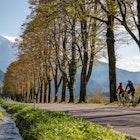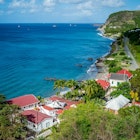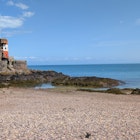
Jul 1, 2025 • 5 min read
For tourists in Japan, taxis are comfortable and convenient. Here's how to hail, ride and pay.

Jul 1, 2025 • 5 min read
For tourists in Japan, taxis are comfortable and convenient. Here's how to hail, ride and pay.

Jul 1, 2025 • 5 min read
As one of Italy’s great unsung destinations, Turin is a good year-round destination. Here's when to make the most of it.

Jul 1, 2025 • 10 min read
With its historic churches, gorgeous art, dreamy beaches and urban tableaux, Sicily brims with free experiences. These are 12 of the best ones.

Jul 1, 2025 • 7 min read
Plan a cycling trip on the new Alpina Mediterranean, a bike trail linking Italy, Slovenia and Croatia.

Jul 1, 2025 • 8 min read
From lazing on beaches in Turkey to sipping Guinness in Dublin or traveling through Mongolia, here are the best places to visit in September.

Jul 1, 2025 • 9 min read
Navigating the many islands of Indonesia is easy by planes, trains, buses, ferries and local transport – here are the best ways to explore the archipelago.

Jul 1, 2025 • 6 min read
Plan a trip to Sint Eustatius with this first-timer's guide to one of the Caribbean’s lesser-known islands.

Jul 1, 2025 • 6 min read
Despite its sprawling layout and challenging traffic, Atlanta is easy to navigate if you know how, both with your own wheels or on public transportation.

Jul 1, 2025 • 6 min read
Boston is an easy-to-navigate city, from riding the T to using the city's bike-share program.

Jul 1, 2025 • 8 min read
These hints and tips will save you time, money and potential embarrassment when you visit Budapest, from avoiding fines to tipping your server.

Jun 30, 2025 • 8 min read
Discover the best things to do in Beijing, from historic hutongs and the Great Wall to street food, royal palaces and vibrant local culture.

Jun 30, 2025 • 8 min read
Tap into the fabled energy of Buenos Aires with our pick of the city's top experiences.

Jun 30, 2025 • 5 min read
One of Malaysia’s most beloved cuisines is also among the world’s most unique. Here’s all you need to know about Kristang food, a speciality of Melaka.

Jun 30, 2025 • 3 min read
Boston flaunts its magic all year round, with outdoor fun in summer, foliage in fall, sunshine in spring and snowy scenes in winter.

Jun 30, 2025 • 10 min read
You'll find historic sites, a vibrant art scene and architectural icons in Boston's top neighborhoods.

Jun 30, 2025 • 9 min read
The Channel Island of Jersey is blessed with white sand beaches, excellent seafood and many historic sites to explore.

Jun 30, 2025 • 12 min read
Food can make or break a travel experience. From Texas to Spain and between, these destinations deliver sensory memories you won't soon forget.

Jun 30, 2025 • 8 min read
The sandy beaches, fresh seafood and Indigenous culture of Prince Edward Island, Canada's smallest province, will lure you with its salt-of-the-earth charm.

Jun 30, 2025 • 9 min read
Incredibly intact ruins of ancient Rome are dotted across Tunisia's landscape. Here's our pick of the best sites.

Jun 30, 2025 • 11 min read
The quintessentially rural region of Burgundy offers sensational food and wine, historic sights, cycling, canal boating and plenty of joie de vivre

Jun 30, 2025 • 7 min read
Planning your first trip to Bulgaria? Here’s when to go, what to see and how much to budget while you’re there.

Jun 29, 2025 • 8 min read
Alabama has a surprising variety of landscapes, vast biodiversity and a friendly cast of small Southern cities and towns to explore.